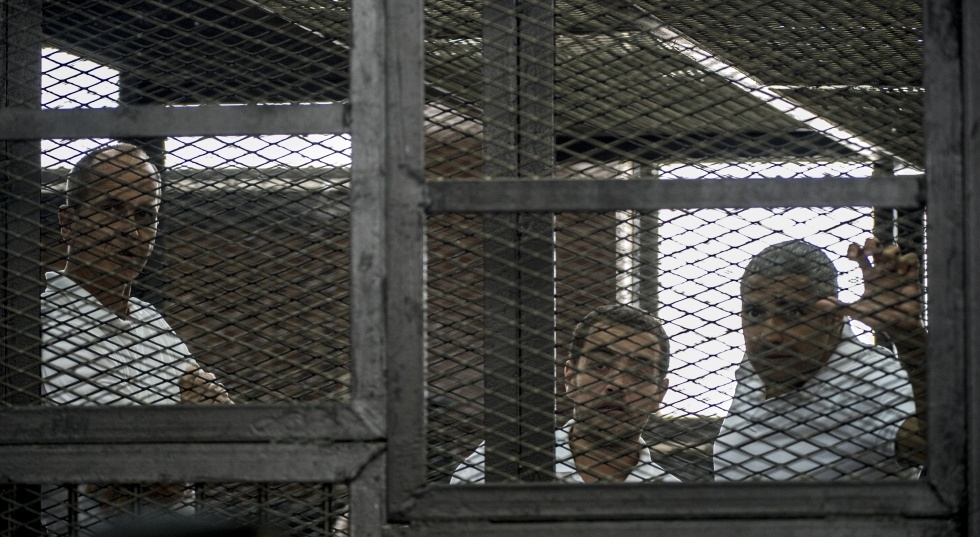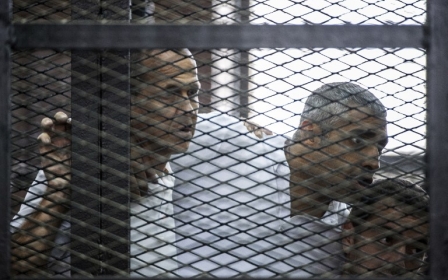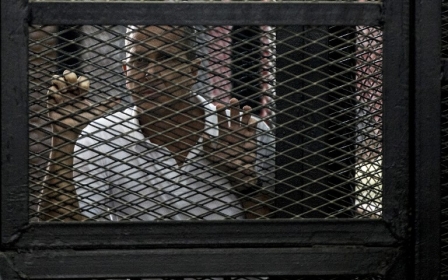Al Jazeera reporter released, but Egyptian colleagues remain behind bars

After 400 days of imprisonment, Al Jazeera English’s journalist Peter Greste was finally released from Egypt’s Tora prison. Greste was immediately put on a plane by the Egyptian authorities to send him to his native Australia, yet his two Al Jazeera colleagues Mohamed Fahmy and Baher Mohamed remain incarcerated.
The three journalists were arrested on 29 December 2013 following a police raid on the Marriott Hotel, where Greste and Fahmy were staying. Mohamed was arrested from his home. They were falsely charged a month later with operating without a license, spreading false information, and collaborating with the outlawed Muslim Brotherhood organisation, following the military takeover in the summer of that year.
The official verdict came on 23 June 2014, which sentenced the three journalists to 7 years in prison. Baher Mohamed was given an additional 3 years for having a single bullet in his possession. Their sentencing prompted a surge of international outcry, and was seen as a staple characteristic of the new Egyptian government. In November, President Sisi signed a decree allowing for a repatriation of foreign prisoners. Two months later, on New Year’s Day, Egypt’s top court ordered for the retrial of the 3 journalists.
The release of Greste is attributed to him holding a foreign passport, which according to the decree that Sisi signed, specified his release and deportation from Egypt. While it came at a surprising time, following the killing of 30 Egyptian soldiers in the Sinai, the continuous imprisonment of his colleagues has raised questions as to whether they will also be released.
Mohamed Fahmy, the channel’s former bureau chief in Cairo, has Canadian citizenship. Presidential sources hinted that his release is imminent, after having his Egyptian nationality revoked. His fiancé Marwa Omara told Reuters, “His deportation is in its final stages. We are hopeful.”
The more serious question marks are poised at Baher Mohamed’s fate, a producer, since he does not have dual nationality.
Baher’s brother Assem was quoted by Reuters saying, “Those who rule the country, this is not the first time they’ve done this. There have been foreigners who they have let leave the country when they are in trouble and their Egyptian colleagues are the ones who paid the price.”
The Director General of Al Jazeera Media network Mostefa Souag expressed his happiness regarding Peter Greste’s release, and called upon the Egyptian government to release the other two.
“We will not rest until Baher and Mohamed also regain their freedom,” Souag vowed. “The Egyptian authorities have it in their power to finish this properly today, and that is exactly what they must do.”
Al Anstey, the Managing Director of Al Jazeera English, stressed that Greste’s release further trains the spotlight on the fact that there were still Al Jazeera employees languishing in the Tora prison.
“We’ve got to focus that Baher and Mohamed are still behind bars, and several of their colleagues that were sentenced to 10 years in absentia are still sentenced today,” he said.
In his first interview following his release, Peter Greste told Al Jazeera on Monday that he felt an “incredible angst about my colleagues, leaving them behind.”
“If it’s appropriate for me to be free, it’s right for all of them to be free,” he added.
New MEE newsletter: Jerusalem Dispatch
Sign up to get the latest insights and analysis on Israel-Palestine, alongside Turkey Unpacked and other MEE newsletters
Middle East Eye delivers independent and unrivalled coverage and analysis of the Middle East, North Africa and beyond. To learn more about republishing this content and the associated fees, please fill out this form. More about MEE can be found here.




